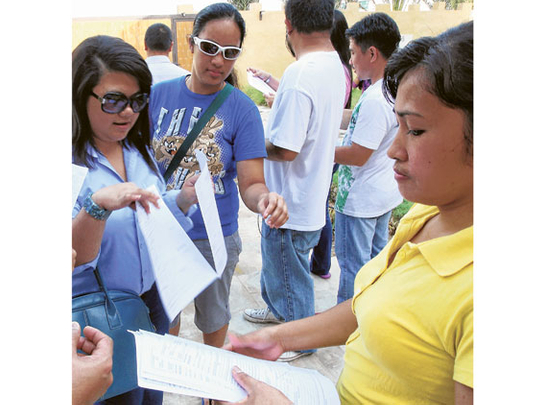
Dubai The Inter-Agency Council Against Trafficking (IACAT) will meet to review the Philippine Bureau of Immigration (BI) policy in offloading passengers or preventing visit or tourist visa holders from flying to the UAE and other countries, according to Philippine Vice-President Jejomar Binay. Reports of harassment and extortion by BI officials will also be looked into.
"Through the policy, we have been able to stop thousands of victims of human trafficking from leaving the country. On the other hand, there are those who are offloaded even if they have legitimate documents and are not victims of illegal recruiters," Vice-President Jejomar Binay, Presidential adviser on Overseas Filipino Workers and Chair Emeritus of IACAT, told Gulf News in a phone interview.
IACAT is the body mandated by law to coordinate and monitor the implementation of Republic Act No. 9208, or the Anti-Trafficking in Persons Act of 2003, with the Department of Justice as the lead agency. Various government and non-government agencies form IACAT, including the Department of Foreign Affairs, Labour and Employment, Philippine Overseas Employment Administration, and Bureau of Immigration, among others.
Double-edged sword
In a bid to curb human trafficking, the BI issued Memorandum Circular No. RPL-10-004 in August 2010 stating that the bureau may regulate travellers with visit or tourist visas. BI officials assess travellers according to the "their personal capacity to travel, such as appearance, demeanour, current employment, financial capability, etc., at the time they present themselves for departure formalities."
As an effect, UAE-based Filipinos who want to sponsor family and relatives to the UAE have to secure an authenticated affidavit of support (Afos) or declaration of sponsorship from the Philippine Embassy or Consulate for Dh100. But BI officials have the blanket authority to offload a person or declare him as one "who does not have the capacity to travel" even if he has an Afos with him.
Around 28,000 passengers have been offloaded this year on suspicions that they are victims of human trafficking, according to Vice-President Binay.
Various groups have petitioned to scrap the Afos as it is not a travel requirement of the Dubai government and is dubbed as "useless" in Manila. Recent reports said the policy has become an extortion racket for some BI agents.
Extortion
Gulf News has reported cases of extortion at Manila airports with some BI agents allegedly acting as "escorts" to aid Filipinos through the process of exiting the country. Passengers alleged that they had to pay grease money ranging from 15,000 pesos (Dh1,296) to 50,000 pesos (Dh4,321). But some claimed that they still got offloaded even with the "escort service."
Philippine Consul General Benito Valeriano said he has heard of the alleged extortion racket. However, he said that no one has come forward to give a sworn testimony about it. "It is not for me to comment whether it is necessary or not. We are just a notary public here. People who are victims should come forward, execute a statement so we can report to Manila and catch that fellow," he said.
3 out of 10 suffer
J.J., a senior travel consultant who refused to be identified, said that based on their office records, three out of 10 people get offloaded daily at Manila airports. The majority of these cases are those sponsored by friends to visit the UAE.
A usual tourist or visit visa sponsorship costs around Dh3,000 per person, including plane fares, Afos and courier fees. Once a passenger is offloaded, his ticket can be rebooked depending on airline terms and conditions. Based on J.J.'s experience, a passenger will not be allowed to leave the country once he has been offloaded three times.
"The sponsor can have the plane fare refunded but it would take three weeks to a month. But there are promo fares that cannot be refunded. The maximum that a sponsor can get back from his money is Dh1,000," J.J. told Gulf News.







